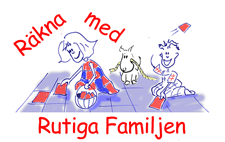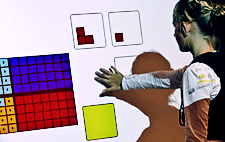 Till AIED konferensen 15th International Conference on Artificial Intelligence in Education, in Auckland, Nya Zeeland, presenterade Lena Pareto och kollegorna Tobias Arvemo (Högskolan Väst), Ylva Dahl (Uddevalla Skolor), Magnus Haake samt Agneta Gulz (Lund Universitet) följande artikel 2011 :A Teachable-Agent Arithmetic Game’s effects on Mathematics Understanding, Attitude and Self-Efficacy (eftersom artikeln publiceras internationellt, är den på engelska.)
Till AIED konferensen 15th International Conference on Artificial Intelligence in Education, in Auckland, Nya Zeeland, presenterade Lena Pareto och kollegorna Tobias Arvemo (Högskolan Väst), Ylva Dahl (Uddevalla Skolor), Magnus Haake samt Agneta Gulz (Lund Universitet) följande artikel 2011 :A Teachable-Agent Arithmetic Game’s effects on Mathematics Understanding, Attitude and Self-Efficacy (eftersom artikeln publiceras internationellt, är den på engelska.)
Abstrakt: A teachable-agent arithmetic game is presented and evaluated in terms of student performance, attitude and self-efficacy. An experimental pre-post study design was used, enrolling 153 3rd and 5th grade students in Sweden. The playing group showed significantly larger gains in math performance and self-efficacy beliefs, but not in general attitude towards math, than the control groups. The contributions in relation to previous work include a new educational game being evaluated, and an emphasis on self-efficacy in the study as a strong predictor of math achievements. » Läs mer
Rutiga Familjen hos elever som upplever svårigheter i matematik
 Till EC-TEL konferensen 5th European Conference on Technology Enhanced Learning, i Barcelona, Spanien, publicerades följande artikel 2010: The Complexity of Integrating Technology Enhanced Learning in Special Math Education: a Case Study (eftersom artikeln publiceras internationellt, är den på engelska.)
Till EC-TEL konferensen 5th European Conference on Technology Enhanced Learning, i Barcelona, Spanien, publicerades följande artikel 2010: The Complexity of Integrating Technology Enhanced Learning in Special Math Education: a Case Study (eftersom artikeln publiceras internationellt, är den på engelska.)
Abstrakt: We present a study of integrating an educational game in special math education, to explore challenges faced during the process. The game promotes an unconventional approach supporting students having math difficulties, through visual representations, learn-by-exploration and learn-by-teaching models. Our conclusion is that integration in special education is more challenging than in the main stream counterpart, due to social vulnerability of the students, learning/teaching challenges in content, motivation and attitude, a non-typical learning situation, and the challenge of matching learning peers. » Läs mer
Spelet är utvecklat för att främja kausal reflektion och gynna bra val
 Till APLEC konferensen International Workshop on Adaptation and Personalization in E-B/Learning using Pedagogic Conversational Agents, in Hawaii, USA, presenterade Lena Pareto följande artikel 2010: A Teachable Agent Game for Elementary School Mathematics promoting Causal Reasoning and Choice (eftersom artikeln publiceras internationellt, är den på engelska.)
Till APLEC konferensen International Workshop on Adaptation and Personalization in E-B/Learning using Pedagogic Conversational Agents, in Hawaii, USA, presenterade Lena Pareto följande artikel 2010: A Teachable Agent Game for Elementary School Mathematics promoting Causal Reasoning and Choice (eftersom artikeln publiceras internationellt, är den på engelska.)
Abstrakt: We describe a mathematics computer game for children designed to promote causal reasoning, choice-making, and other higher-order cognitive activities. The game consists of a choice-based board game, enhanced with a conversational, teachable agent, taught to play the game, by the child, through demonstrations and questions. Game design is motivated by causal reasoning theory and educational psychology. The game is currently evaluated in an ongoing large-scale study that seeks to investigate the game’s effects on the players’ abilities to reason and make productive choices. The study involves 20 elementary-school classes at different levels. » Läs mer på s.18
Agenten och modellen ”lära-genom-handledning” kan gynna lärandet hos lågpresterande elever
 Till AIED International Conference on Artificial Intelligence in Education, in Brighton, Storbritannien, presenterade Lena Pareto med kollegorna Daniel L. Schwartz från Stanford University, USA och Lars Svensson från Högskolan Väst, följande artikel 2009: Learning by guiding a teachable agent to play an educational game (eftersom artikeln publiceras internationellt, är den på engelska.)
Till AIED International Conference on Artificial Intelligence in Education, in Brighton, Storbritannien, presenterade Lena Pareto med kollegorna Daniel L. Schwartz från Stanford University, USA och Lars Svensson från Högskolan Väst, följande artikel 2009: Learning by guiding a teachable agent to play an educational game (eftersom artikeln publiceras internationellt, är den på engelska.)
Abstrakt: Teachable agents are used to support transfer of game playing knowledge to domain knowledge for an educational, arithmetic game. A pre-posttest experiment study show promising learning effects for low ability students. » Läs mer
Om spelets agent och lärmodellen ”att lära-genom-vägledning”
 Till AIED International Conference on Artificial Intelligence in Education, in Brighton, Storbritannien, presenterade Lena Pareto följande artikel 2009: Teachable Agents that Learn by Observing Game Playing Behavior (eftersom artikeln publiceras internationellt, är den på engelska.)
Till AIED International Conference on Artificial Intelligence in Education, in Brighton, Storbritannien, presenterade Lena Pareto följande artikel 2009: Teachable Agents that Learn by Observing Game Playing Behavior (eftersom artikeln publiceras internationellt, är den på engelska.)
Abstrakt: An educational game in mathematics targets cognitive skills oincluding pattern finding and generalization from example by teaching an agent. These can be difficult for young children, let alone teaching about them. Therefore, we have designed a new way of teaching an agent, the teach-by-guiding model. We describe the model and its basic implementation. Because this is a work-inprogress, we end by raising questions of how such an agent is perceived, and in what respect it may differ from other pedagogical agents. » Läs mer på s.31
Introduktion av konceptet ”utility games”, spelutveckling ur nyttighetsperspektiv
 Till LearnIT konferensen Game in ´Action i Göteborg, presenterade Lena Pareto följande artikel 2007: Utility Games: gaming as a design strategy to achieve utility effects (eftersom artikeln publiceras internationellt, är den på engelska.)
Till LearnIT konferensen Game in ´Action i Göteborg, presenterade Lena Pareto följande artikel 2007: Utility Games: gaming as a design strategy to achieve utility effects (eftersom artikeln publiceras internationellt, är den på engelska.)
Abstrakt: The objective of this study is to introduce the concept of utility games, to develop a characterization of such a game category, and to explore design and evaluation issues particular for this category. By utility games, we refer to games predominantly designed for utility purposes, and where gaming is viewed as a design strategy to achieve the utility. Four utility games were analysed, with the following dimensions: the overall context, the utility objective, the game setting, evaluations performed and challenges related to design and evaluation. The analysis shows that the utility aspects and the game design are highly interrelated and affect each other on all levels of the design, and that evaluations of utility games have many dimensions to consider. A summary of lessons learnt and some recommendations to utility game designers are provided. » Läs mer




